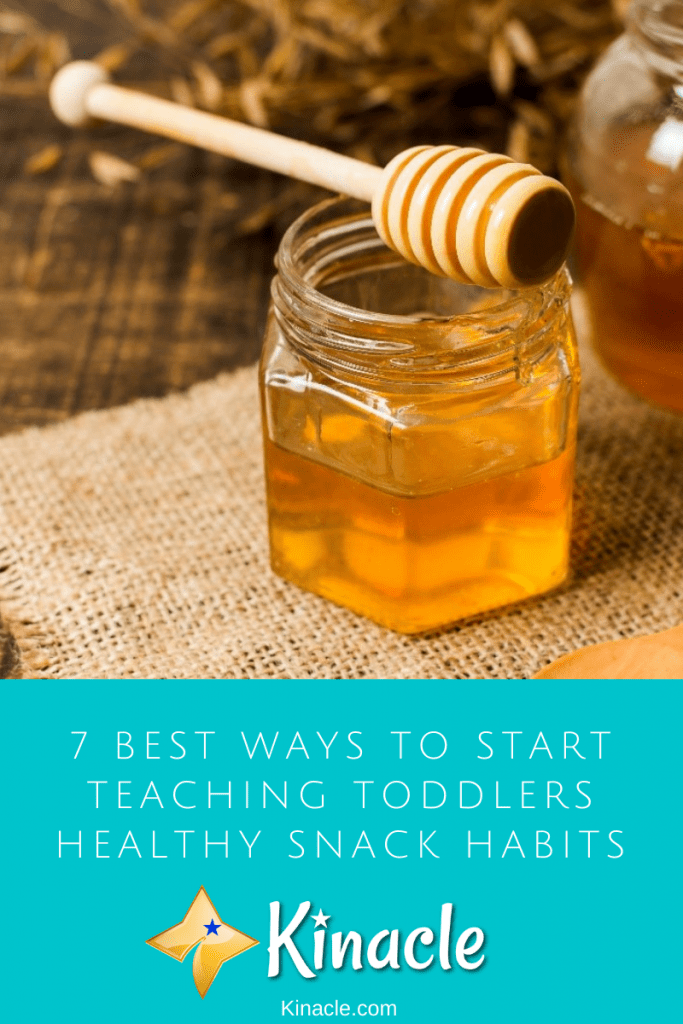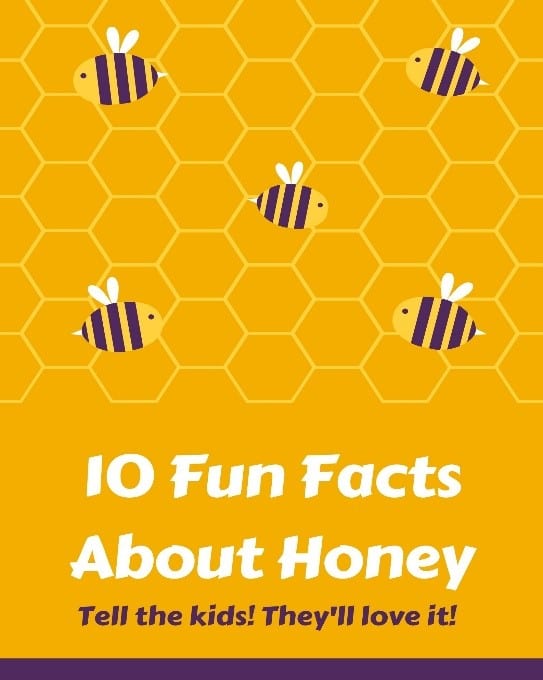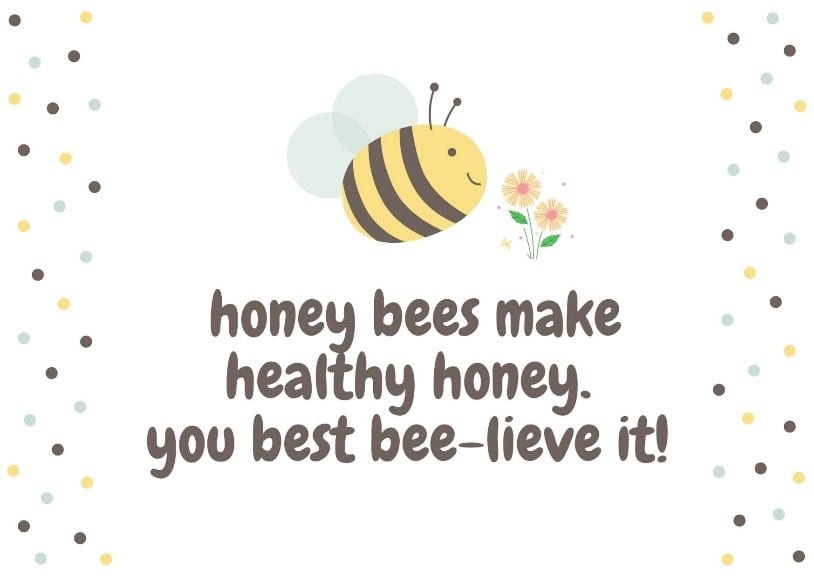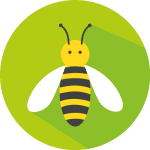
Officially declared unsafe for babies under one-year-old, we’ll help you understand honey’s medicinal benefits and if it’s an ideal home remedy if your baby catches the common cold, cough, tummy ache and other general ailments.
Due to the ongoing pandemic and everyone advised to stay home unless absolutely necessary, parents may be hesitant to take their sick babies to their doctor’s clinics for routine check-ups and might resort to more natural, home remedies like honey.
But is honey actually safe for your baby?
We’ll investigate honey’s medicinal attributes and let you in on the facts.
Speaking of facts… did you know that honey is actually really interesting? More than just the sweet nectar created by bees and Winnie The Pooh’s favorite snack, here are 10 fun, buzzworthy facts about honey:
10 Buzzworthy Facts About Honey

- Humans have been consuming honey since the Stone Age – that’s around 8,000 years ago! Can you believe it? Archaeologists found evidence in Stone Age paintings depicting ancient humans using honey.
- Honey is more than just flower nectar – it is also a by-product of the honeybee’s upper aero-digestive tract. Aren’t honey bees amazing?
- Speaking of honey bees, making honey involves complex processes that make honey bees nature’s expert chemists!
- Honey contains more than just sugar – studies show that honey actually contains about 200 substances. Other than fructose and glucose, it contains fructo-oligosaccharides, several types of amino acids, vitamins, minerals and enzymes. You can learn more about the “Chemistry of Honey” here.
- Honey is so super healthy that it is the only food that has all necessary substances needed to sustain life – including water!
- Speaking of water – honey is actually 20% water and 80% sugars.
- A busy little honey bee must gather nectar from over 2 million flowers and fly a total of 55,000 miles to make one pound of honey. So, if you see flowers outside or in your garden, don’t pick them! It might just help honey bees passing through make more honey.
- Once sealed in an airtight container, honey will never spoil and can last thousands of years! In fact, honey has been found in ancient Egyptian tombs – still edible and good to eat.
- Not all bees make honey and not all honey comes from bees. There are only 7 known species of bees that make honey. The Mexican Honey Wasp has been known to make honey, as well – but beware, sometimes their honey can be poisonous.
- Honey bees are experts at what they do because they’ve been making honey for around 130 million years! That’s a lot of years – and a lot of honey.
Not just yummy and delicious but almost magical in its composition – honey is indeed one of nature’s best superfoods. So, it’s not a surprise that it has vast medicinal and antibacterial properties, as well.

In fact, the use of honey for medicinal purposes can be traced back thousands of years ago. Ancient Egyptians, Assyrians, Greeks, Chinese and Romans all show evidence of having used honey as treatment for wounds and general diseases of the gut.
Older than the history of medicine itself, traditional Indian Ayurveda medicine both show extensive evidence of their medical practitioners using honey as wound salves, natural cough medicine, treatment of eye ailments and even with its sweet, sugary properties, Ayurvedic medicine uses honey to help keep gums and teeth healthy.
However, it was only in 1892 that Dutch scientist Van Ketel discovered the antibacterial properties of honey. It was one of the most important clinical findings about honey during that time. Other scientists and medical experts did similar studies and backed up Van Ketel’s findings and learned that it was the high sugar content (accounts for 80% of honey’s composition) and other bacteriostatic substances naturally present in honey that are responsible for its antibacterial properties.
For example, a type of honey native New Zealand called Manuka Honey is famously known for its antibacterial, anti-viral and anti-inflammatory properties. So much so that it actually prevents diarrhea-causing bacteria from settling in the body and causing more damage. Recent studies also show that Manuka Honey may be the key in fighting MRSA – a serious, antibiotic-resistant bacterial infection that affects about 5% of Americans. You’ll find a complete list of science-backed health benefits of Manuka Honey here.
You have to remember that honey has been used as alternative medicine for years! Try asking a grandparent or an elderly member of your family and you’ll most likely hear an anecdote or two about honey and its wondrous health benefits.
What about babies, though? Was honey given to young children in the past, as well?
The quick answer is, “Yes!”
And not just when they’re sick, too.
Both ancient Egypt and Friesland in Germany gave newborns a taste of honey. They believed it gave infants the energy they need to be “truly alive” and also as spiritual protection from the gods.
Fast forward to the more modern world, public health officers during the Great Depression used honey to help undernourished infants regain their health. In fact, it wasn’t until 1978 that honey was declared unsafe for babies under a year old. Years before that, honey was considered perfectly safe to give to babies.
Still, at one point or another, parents have probably been told by well-meaning friends and family members to give honey to a coughing baby or a child that’s generally feeling ill. On the other hand, some parents might also hear the opposite advice – “No, honey isn’t safe for babies. Never, under any circumstance, give honey to your baby.”
Because of contradicting information, you might be a bit confused and not quite sure who to believe. On one hand, you’d like to offer relief to your baby, but on the other hand, you want to be absolutely safe. You would never want your baby to be at risk for any infections or disease.
Also, even if your baby is perfectly healthy, you also might want to introduce new tastes and textures and honey is perfect for this purpose. It’s a bit gooey and sticky and it’s definitely sweet. What’s the harm in putting a bit of honey in your baby’s fruit snack today, right? Well, you might want to hold off on that and read the rest of the article to see what our advice is.

Should you give honey to a baby under a year old?
The official answer is “No”.
Here’s why:
Even with all the beneficial substances naturally found in honey, it’s known to contain bacterial spores that may cause infant botulism in very young babies, especially those under 12 months old who have immature and underdeveloped immune systems and digestive systems.
Infant botulism can be fatal. Affected babies need treatment in the ICU as one of the more serious symptoms include breathing problems and trouble swallowing.
However, as the baby becomes older than 12 months, the same bacterial spores become less harmful. Preschoolers and adults are not prone to these bacterial spores in honey, as well.
It’s still good to note, however, that the botulinum toxin that causes botulism may still be dangerous for everyone, regardless of age, as some types of food may still contain it such as improperly canned food and fermented fish. You can find a list created by foodsafety.gov here.
How did doctors find bacterial spores in honey, anyway?
Around 1976, hospitals in California experienced a patient surge of infant botulism for the first time. If not diagnosed earlier in the illness, very young babies could potentially die. But if treated earlier, then babies have a great chance of recovering.
Scientists sought to investigate the origin of this illness. They did tests and found traces of botulism spores in the baby’s stool results. The California Department of Health Services then followed up with an extensive study and found dangerous botulism spores in nine samples of honey. The same study also found botulism spores in five types of soil and one dust sample from vacuum cleaners.
However, since honey was commonly fed to young babies at the time whether as a way to sweeten food, milk or given as a home remedy, the U.S. then alerted the general public and released health warnings that prohibited under-one babies to be fed with honey citing fatal risks of infant botulism. That’s when warning labels were placed on jars of honey sold in almost all grocery stores in the U.S. saying honey is not suitable for children under a year old.
Bottom line:
Due to dangerous bacterial spores that may cause fatal infant botulism, infants and young babies should never be fed both pure honey or any processed food containing honey e.g. cereal, smoothies, baby food, pacifiers with honey, etc.
With all this definitive data and information about honey causing infant botulism, a small group of doctors and scientists still believe that honey is absolutely safe for babies of all ages. Among other things, pro-honey doctors’ chief argument is that there isn’t strong enough research that shows that honey is dangerous for infants in the first place citing that the mortality rate for babies from infant botulism is quite low.
Still, almost any pediatrician you talk to will usually advice against honey for infants. Based on our research and from everything that we know, we would always want to go with safe than sorry. Because of the seriousness of infant botulism, we’d rather steer clear of honey and avoid it until the baby’s first birthday.
That said, should your baby have symptoms of cough, colds or an upset tummy, here’s some general advice about when you need to call your doctor:
- If your baby is less than a month old, call your pediatrician right away and ask for initial advice.
- If your infant is less than 3 months old and the symptoms have gone on for more than 24 hours, call your pediatrician.
- If your infant is less zero to 3 months old and is running a fever, along with other symptoms such as runny nose and wet/dry cough, do not wait for 24 hours. Call your pediatrician immediately.
Due to the COVID-19 pandemic, however, parents should be extra careful. As this is an entirely new virus, doctors and scientists are still continuously learning about it. We were initially informed that the virus is seemingly sparing our children and the elderly as reported by the Washington Post back in early March. Just about a couple of weeks later, articles were published by both Live Science and the New York Times saying that there is a percentage of children that develop fatal symptoms, especially younger babies.
That said, it’s also allergy season! And sometimes, even while in isolation, babies can still catch allergies and may occasionally sneeze or have a stuffy nose. Other allergens and irritants abound in the house, too; such as dust, perfume, even certain types of food.
Right now, the important thing is to always stay calm and have presence of mind. Don’t run to the doctor’s or the E.R. right away as hospitals aren’t considered safe, at the moment. Calling your pediatrician or assessing your baby’s symptoms together with a health expert should help both you and your baby.
There are other natural home remedies that are safe for infants, as well! Honey is only one of many.
Here are some home remedies you can try with your baby if they have the occasional stuffed-up nose:
- An infant massage could do wonders for a little one who’s feeling under the weather.
- Lots of liquids for babies already on solids. But for babies younger than 6 months, water isn’t advised. Formula or breastmilk will do.
- Lots of rest. If your baby is feeling unwell, they’ll feel tired, too. Let them nap or have them lay quietly in their crib with soothing music.
- Baby vapor rub for babies 3 months or older. The cooling sensation when massaged on the chest area helps babies breathe better.
You can also try over-the-counter medicine, however, always ask your pediatrician before doing so as young infants aren’t generally advised to take in cough or colds medicine.
We started this article with honey’s health benefits and we’ll end it in the same way as well because as soon as your baby is ready for honey, though, it’s going to do wonders for their overall health.
Benefits Of Honey For Toddlers
Here’s a quick list of top benefits that toddlers 2 years and older can get from some yummy honey:
- Lots of healthy energy! Honey is 80% sugars but not the unhealthy type found in sugary snacks. It contains fructose that provides a steady supply of healthy energy that a toddler needs to play, learn and discover.
- Did your toddler just skin their knee? Honey promotes faster healing for your toddler’s little cuts and scrapes.
- Soothes and helps with general skin irritations. Should they get rashes or dry skin, honey can help heal and moisturize.
- Soothes an irritated throat and calms down cough.
- Honey contains lots of natural vitamins and minerals that are proven to be healthy for your toddler.
- Protects your child’s liver from any damage especially from doses of paracetamol which is usually what is given to them when they are running a fever. Mary Poppins’ advice to take a spoonful of sugar with medicine isn’t far off – but replace that with a spoonful of honey and protect your toddler’s liver.
- It’s delicious! Mix it up with some cool lemonade and it’s the perfect drink for hot days.
When choosing honey for your toddler, we advise for you to get organic honey as opposed to commercially-produced honey or locally-produced honey. Organic honey contains less allergens that may be harmful for your toddler. Some types of honey sold in grocery stores also include other ingredients. Make sure you check the label to ensure it is safe for your toddler.
Conclusion
While parents are advised to never to give honey as a home remedy or food supplement to babies younger than 12 months old, it’s natural, healthy properties have proven very beneficial for the health of toddlers and older children, too.
Do you give honey to your kids? Do they love it? Share with us your sweet, honey stories. We’d love to hear from you!
It’s very important to be mindful of what a parent allow the baby eat or even feed the baby themselves because they are too tender and anything can go wrong when you least expect it to happen. Yes, honey has benefiting effect or nutrients it gives but when it’s consumed when it’s not supposed to be, then it becomes a problem for the toddler.